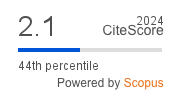Machine Learning Models in the large-scale prediction of parking space availability for sustainable cities
DOI:
https://doi.org/10.4108/eetiot.2269Keywords:
Machine learning, Parking space prediction, Urban congestion reduction, Smart cities, Multi-output regression, Random Forest algorithm, Extra Tree algorithmAbstract
The search for effective solutions to address traffic congestion presents a significant challenge for large urban cities. Analysis of urban traffic congestion has revealed that more than 70% of it can be attributed to prolonged searches for parking spaces. Consequently, accurate prediction of parking space availability in advance can play a vital role in assisting drivers to find vacant parking spaces quickly. Such solutions hold the potential to reduce traffic congestion and mitigate its detrimental impacts on the environment, economy, and public health. Machine learning algorithms have emerged as promising approaches for predicting parking space availability. However, comparative studies on those machine learning models to evaluate the best suited for a large-scale prediction and within a given prediction time period are missing.
In this study, we compared nine machine learning algorithms to assess their efficiency in predicting long-term, large-scale parking space availability. Our comparison was based on two approaches: using on-street parking data alone and 2) incorporating data from external sources (such as weather data). We used automatic machine learning models to compare the performance of different algorithms according to the prediction efficiency and execution time. Our results indicated that the automated machine learning models implemented were well fitted to our data. Notably, the Extra Tree and Random Forest algorithms demonstrated the highest efficiency among the models tested. Moreover, we observed that the Random Forest algorithm exhibited less computational demand than the Extra Tree algorithm, making it particularly advantageous in terms of execution time. Therefore, this work suggests that the Random Forest algorithm is the most suitable machine learning model in terms of efficiency and execution time for accurately predicting large-scale, long-term parking space availability.
Downloads
References
D. Schrank, B. Eisele, T. Lomax, 2021 Urban Mobility Report, (2021).
R. Doolan, G.-M. Muntean, VANET-Enabled Eco-Friendly Road Characteristics-Aware Routing for Vehicular Traffic, in: 2013 IEEE 77th Vehicular Technology Conference (VTC Spring), 2013: pp. 1–5.
S.S. Pulugurtha, V.R. Duddu, M. Venigalla, Evaluating spatial and temporal effects of planned special events on travel time performance measures, Transportation Research Interdisciplinary Perspectives. 6 (2020) 100168.
S. Kazi, S. Nuzhat, A. Nashrah, Q. Rameeza, Smart Parking System to Reduce Traffic Congestion, in: 2018 International Conference on Smart City and Emerging Technology (ICSCET), 2018: pp. 1–4.
INRIX Economic Cost of Parking Pain Report, https://www2.inrix.com/research-parking-2017.
An efficient smart parking pricing system for smart city environment: A machine-learning based approach, uture Generation Computer Systems, 2020: pp. 622-640.
G. Jelen, V. Podobnik, J. Babic, Contextual prediction of parking spot availability: A step towards sustainable parking, Journal of Cleaner Production. 312 (2021) 127684.
Y. Zheng, S. Rajasegarar, C. Leckie, Parking availability prediction for sensor-enabled car parks in smart cities, in: 2015 IEEE Tenth International Conference on Intelligent Sensors, Sensor Networks and Information Processing (ISSNIP), 2015: pp. 1–6.
F. Al-Turjman, A. Malekloo, Smart parking in IoT-enabled cities: A survey, Sustainable Cities and Society. 49 (2019) 101608. https://doi.org/10.1016/j.scs.2019.101608.
J. Arjona, M.P. Linares, J. Casanovas, A deep learning approach to real-time parking availability prediction for smart cities, in: Proceedings of the Second International Conference on Data Science, E-Learning and Information Systems, Association for Computing Machinery, New York, NY, USA, 2019: pp. 1–7.
S. Yang, W. Ma, X. Pi, S. Qian, A deep learning approach to real-time parking occupancy prediction in spatio-temporal networks incorporating multiple spatio-temporal data sources, ArXiv:1901.06758 [Cs, Stat]. (2019). http://arxiv.org/abs/1901.06758 (accessed October 13, 2021).
Los Angeles - Open Data Portal, City of Los Angeles. (n.d.). https://data.lacity.org/browse?category=transportation (accessed April 17, 2022).
Weather Data Services | Visual Crossing, (n.d.). https://www.visualcrossing.com/weather/weather-data-services#/login (accessed October 13, 2021).
L. Breiman, Random Forests, Machine Learning. 45 (2001) 5–32.
F. Martínez, M.P. Frías, M.D. Pérez, A.J. Rivera, A methodology for applying k-nearest neighbor to time series forecasting, Artif Intell Rev. 52 (2019) 2019–2037.
D. Maulud, A.M. Abdulazeez, A Review on Linear Regression Comprehensive in Machine Learning, Journal of Applied Science and Technology Trends. 1 (2020) 140–147.
E. Cule, M. De Iorio, Ridge Regression in Prediction Problems: Automatic Choice of the Ridge Parameter, Genetic Epidemiology. 37 (2013) 704–714.
J. Singh Kushwah, A. Kumar, S. Patel, R. Soni, A. Gawande, S. Gupta, Comparative study of regressor and classifier with decision tree using modern tools, Materials Today: Proceedings. (2021).
J.H. Friedman, Greedy Function Approximation: A Gradient Boosting Machine, The Annals of Statistics. 29 (2001) 1189–1232.
P. Geurts, D. Ernst, L. Wehenkel, Extremely randomized trees, Mach Learn. 63 (2006) 3–42.
A. Sharma, Guided Stochastic Gradient Descent Algorithm for inconsistent datasets, Applied Soft Computing. 73 (2018) 1068–1080.
M. Sabzekar, S.M.H. Hasheminejad, Robust regression using support vector regressions, Chaos, Solitons & Fractals. 144 (2021) 110738.
Downloads
Published
Issue
Section
License
Copyright (c) 2023 EAI Endorsed Transactions on Internet of Things

This work is licensed under a Creative Commons Attribution 3.0 Unported License.
This is an open-access article distributed under the terms of the Creative Commons Attribution CC BY 4.0 license, which permits unlimited use, distribution, and reproduction in any medium so long as the original work is properly cited.




